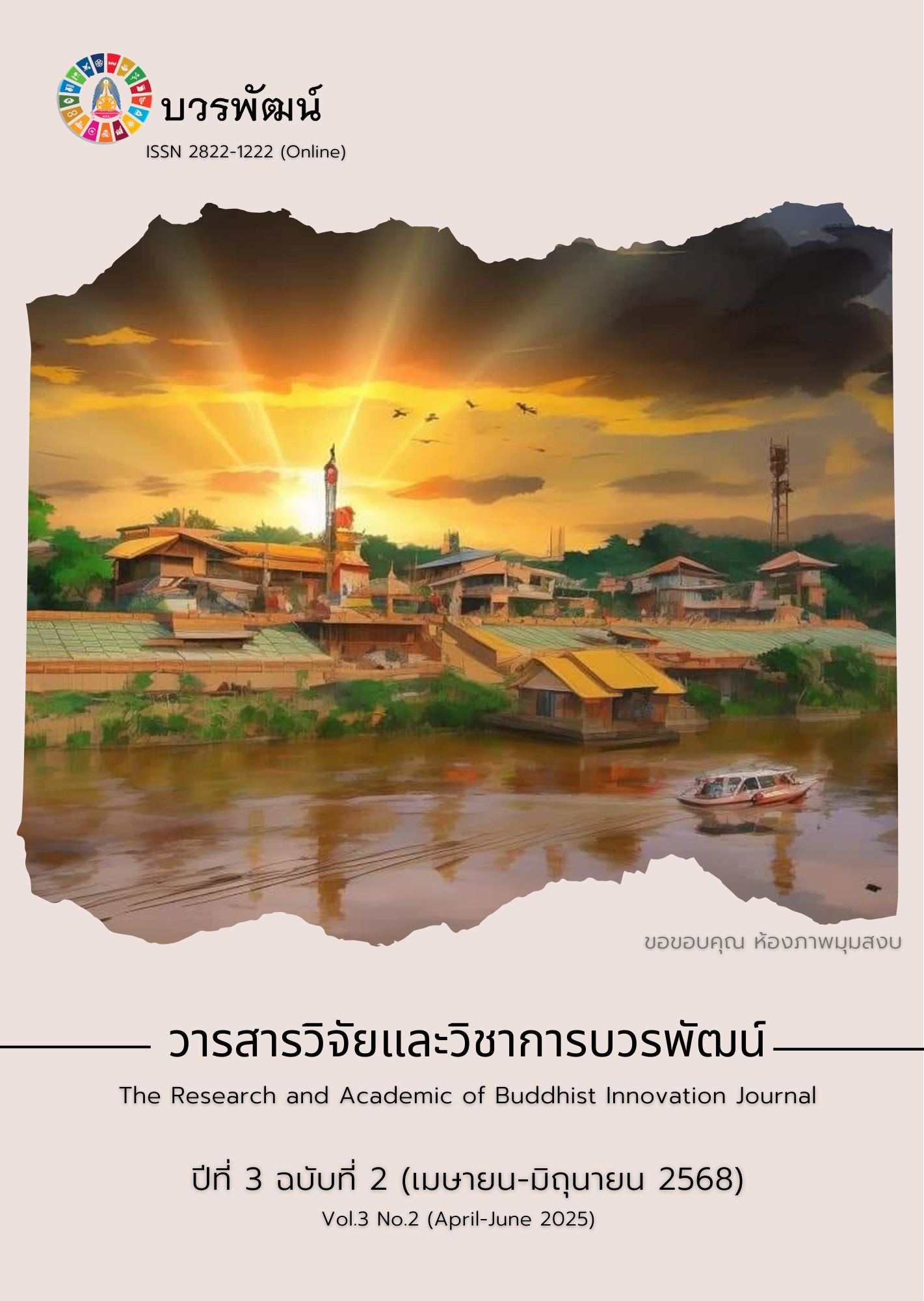Promoting Civil Political Participation in a Democratic Way of Ban Dong Community, Suan Khuean Subdistrict, Mueang Phrae District, Phrae Province
Main Article Content
Abstract
The objectives of this research article were 1) to study the promotion level of civil political participation in a democratic way; 2) to study the relationship between the Saraniyadhamma and the promotion of civil political participation in a democratic way; and 3) to study the problems, obstacles, and solutions to the problem of promoting civil political participation in a democratic way in Ban Dong community, Suan Khuen Subdistrict, Mueang Phrae District, Phrae Province. This research was a mixed-methods research. Quantitative research was conducted by distributing a questionnaire with a reliability value of .835 to a sample group of 300 people selected by stratified random sampling from 1,194 people aged 18 years and over living in Ban Dong community, Suan Khuen Subdistrict, Mueang Phrae District, Phrae Province. The statistics used for data analysis were frequency, percentage, mean, standard deviation, and correlation coefficient. The qualitative research used in-depth interviews with 10 key informants using purposive sampling. And content analysis techniques were used along with context. The research results found that 1) the level of promotion of civil political participation in a democratic way in Ban Dong community, Suan Khuean Sub-district, Mueang Phrae District in all 4 aspects was at a high level overall ( = 3.23, S.D. = 0.54); 2) the relationship between Saraniyadhamma and the promotion of political participation was at a moderately positive relationship (r = .470**); and 3) the problems and obstacles were found that (1) lack of timely and comprehensive information disclosure of the community, (2) people lacked knowledge and understanding of their own roles and responsibilities, (3) local government officials have implemented community development and problem solving projects that did not meet the needs of the people, (4) local government officials did not have sufficient information to evaluate the project and lacked the knowledge to evaluate the project. The recommendations were (1) local government officials should provide opportunities for the public to analyze and distillate problems in every meeting, (2) local government officials should promptly and comprehensively inform information to the community, (3) local government officials should invite and motivate people to participate in community activities.
Article Details

This work is licensed under a Creative Commons Attribution-NonCommercial-NoDerivatives 4.0 International License.
1. เนื้อหาและข้อมูลในบทความที่ลงพิมพ์กับวารสารวิจัยและวิชาการบวรพัฒน์ ถือเป็นข้อคิดเห็น และความรับผิดชอบของผู้เขียนบทความโดยตรงซึ่งกองบรรณาธิการวารสารไม่จำเป็นต้องเห็นด้วย หรือร่วมรับผิดชอบใด ๆ
2. บทความ ข้อมูล เนื้อหา รูปภาพ ฯลฯ ที่ได้รับการตีพิมพ์ในวารสารวิจยวิชาการ ถือเป็นลิขสิทธิ์ของวารสารวิจัยและวิชาการบวรพัฒน์ หากบุคคลหรือหน่วยงานใดต้องการนำทั้งหมดหรือส่วนหนึ่ง ส่วนใดไปเผยแพร่ต่อหรือเพื่อการกระทำการใด ๆ จะต้องได้รับอนุญาตเป็นลายลักษณ์อักษรจากวารสารวิจัยและวิชาการบวรพัฒน์ก่อนเท่านั้น
References
ปัญจพร คำโย และคณะ. (2563). ความคาดหวังของกลุ่มชาติพันธุ์อึมปี้ที่มีต่อผู้นำทางการเมืองท้องถิ่นที่พึงประสงค์. วารสารมนุษยศาสตร์และสังคมศาสตร์ มหาวิทยาลัยอุบลราชธานี, 11(2), 32-49.
พระมหาพัฒนา วฑฺฒนญาโณ และคณะ. (2565). แนวทางการบริหารงานบุคคลตามหลักสาราณียธรรม 6 ของผู้บริหารโรงเรียนพระปริยัติธรรม แผนกสามัญศึกษา จังหวัดเพชรบูรณ์. วารสารวิจยวิชาการ, 5(2), 43–54.
พระสมุห์อมร อมโร (สีดำ) และคณะ. (2562). หลักสาราณียธรรม : แนวทางการประยุกต์ใช้หลักสาราณียธรรมในการมีส่วนร่วมของชุมชนบ้านช่อง ตำบลช่อง อำเภอนาโยง จังหวัดตรัง. วารสารมหาจุฬานาครทรรศน์, 6(4), 1726-1742.
พิสิฐพงศ์ สีดาว. (2562). การมีส่วนร่วมทางการเมืองของนักศึกษาสังกัดอาชีวศึกษาจังหวัดสมุทรสาคร.(วิทยานิพนธ์รัฐศาสตรมหาบัณฑิต สาขาวิชาการปกครอง). บัณฑิตวิทยาลัย : มหาวิทยาลัยมหามกุฏราชวิทยาลัย.
รัฐธรรมนูญแห่งราชอาณาจักรไทย พุทธศักราช 2560. (2560, 6 เมษายน). ราชกิจจานุเบกษา ฉบับกฤษฎีกา, เล่มที่ 134 ตอนที่ 40, หน้า 1.


